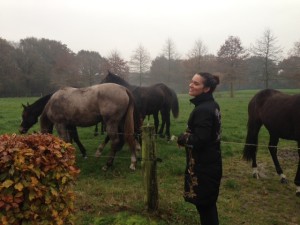Posts Tagged as "customization"
When doing your math homework just isn’t cutting it
Thursday, March 27th, 2014
What if math could make you jump for joy?
Did you ever take the Presidential fitness tests growing up? I vividly remember being asked, about once a year, to run a mile. Even though I got a lot of cardio growing up from serious ballet training, running the mile in middle school and high school pretty much always made me feel like I was going to die. Even if I actually ran the whole thing, there would always come a point midway where it literally felt like my lungs were bleeding inside.
Looking back at this experience, I was like, what the heck were the PE teachers thinking? If you only run a mile once a year of course you are going to suck at it and totally hate it!
What about actually creating a physically fit generation by nurturing students to LOVE to run… not just endure a yearly test? What about actually creating a generation of students who LOVE to do math… not just “get through it” to make the grade?
Whether you’re at the starting line of a race, or freaking out the night before a math test, whenever there’s a gap between what we’re being asked to do, and our preparation, it can create a lot of stress and fear.
And very frequently, the reason you will have trouble in math, or with your physical fitness test, is because – bottom line – the practice you’re assigned is NOT ENOUGH for you to really master the material and be prepared for the task.
Ironically, usually when you’re in that “freaking out” place, the last thing you want to do is do MORE of what is freaking you out… whether it’s running a mile or doing math problems.
It actually requires a significant shift in your mindset, away from “let me just get through this” to “how can I truly master this so I can consistently perform at the level I desire”… And working from that new place of aiming for true mastery is so much more rewarding and satisfying… you can even learn to LOVE what used to fill you with fear and despair.
I’ve seen this transformation in my own life and also in so many of my students’. What I’m talking about here is a much higher and deeper level of taking personal responsibility for your own experience. And the beautiful result of this is realizing that whether or not you “make it” is really, truly up to you, not your teacher’s agenda or assignment schedule.
So how do you DO this? Let me share some super easy to implement tips for how to customize your own “math workout” when you know that your homework alone is not enough.
Here are some great ways to create extra practice that matches what you’re already working on:
1. Super simple: if you are assigned the evens, do the odds for extra practice, or vice versa. Just be sure that you’re able to check your answers somehow so you know you’re practicing things correctly.
(extra tip: If the answers aren’t in the back of the book, you can check a lot of math problems by plugging them into www.wolframalpha.com and it will tell you what the solution is. Just a word to the wise: Wolfram Alpha is a very powerful tool, and it often includes a lot of extra information that might be way more than what you’re looking for or need, so don’t get overwhelmed by all the “extras” – just pay attention to the parts you need, like a solution for ‘x’, for example. Just trust that the more sophisticated stuff will make more sense later on in your math learning adventure!)
2. Look for an ‘extra practice’ section in the back of the book. Most math textbooks have extra practice in the back, but a lot of times teachers won’t mention it or assign problems from it. Again, it’s most valuable when the book also includes solutions to the problems so you can check your work.
3. Don’t wait until the end of the chapter to use the “study guide” or “chapter test” problems for extra practice. Most books have a chapter review at the end of each chapter which will include several extra problems for you to use, labeled by section. Use them for extra practice as you learn each section. You can always revisit them closer to the test if you like!
4. This is a little more advanced: make up your own problems by just changing a few of the numbers. This is best to use if you know there’s a way you can check your answers so you know you’re practicing correctly, or if you are feeling confident about checking your own work.
5. Invest in an extra math textbook for extra practice. (I am a fan of the Algebra 1 & Algebra 2 “Structure and Method: The Classic” books, which also make a good reference.) Use the table of contents and the index to find problems that are similar to the ones that you’re working on.
6. Get the solutions manual or teacher’s manual for your regular textbook. When they’re available, they usually include answers to EVERY problem in the book, not just selected problems.
(Note: Please understand – my intention in suggesting this is absolutely not for students to take a shortcut and skip doing the work of the problem. It’s because it’s something I personally do when I’m learning a new math concept or technique and I want to make sure I can check ALL my work.)
7. Most important: be sure to choose problems where you can check your answers as you go, whether in the back of the book, from wolframalpha, or from a trusted friend or adult. If you don’t know if your answer is correct or not, it’s like practicing the violin wearing earplugs. The only way you know you’re really learning is if you’re getting feedback that you’re on the right track.
Are you tired of watching your kid do their homework diligently night after night, and then bomb their tests and quizzes? Do you dread trying to answer your kid’s questions about math? Are you ready to invest in totally customized support so that your son or daughter can see great results from their hard work and experience math as a source of joy and strength?
If you answered yes to those questions, you’re invited to apply to my very special one-on-one math tutoring programs!
Just click here to get started with your special application. Once your application is received, we’ll set up a special phone call to explore what’s going on with your kid and get clear on whether or not it would be a fit for me to support them! I can’t wait to hear from you!
Sending you love,
REBECCA
Related posts:
How to experience math as your own unique creation
Three simple tips for the night before your math exam
Tips for how to help your kid with their math homework
Self-made heroes: the dancers of planet b-boy
Comment on this post (2)













